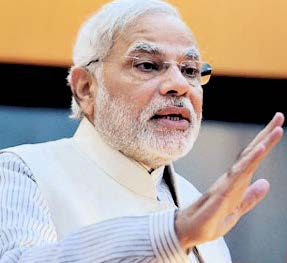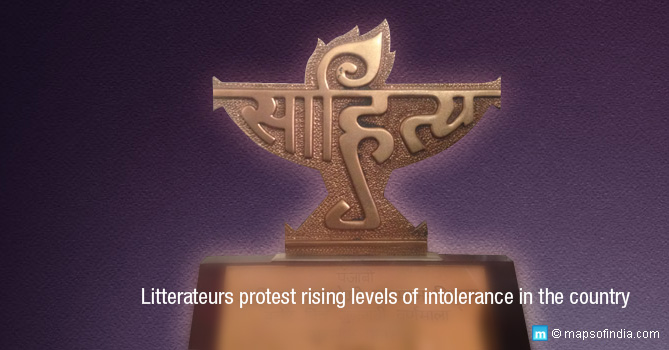
NEW DELHI (TIP): In an extraordinary step to tackle the scourge of black money in the country, Prime Minister Narendra Modi banned Rs 500 and Rs 1,000 notes from November 8 midnight.
In his first televised address to the nation, Modi said people holding notes of Rs 500 and Rs 1,000 can deposit the same in their bank and post office accounts from November 10 till December 30. He explained that the currency notes will be just paper with no value.
Meanwhile, banks, which remained closed on November 9, next day opened to huge rush as people queued up to deposit their old notes in exchange of new currency notes of Rs 500 and Rs 2,000. All ATMs also remained closed for two days.
The PM assured the nation that the notes of Rs 100, 50, 10 and coins of all denominations will remain legal tender and will not be affected and that “this step will strengthen the hands of the common man in the fight against black money.”
However, ATM withdrawals will be restricted to Rs 2,000 per day and withdrawals from bank accounts will be limited to Rs 10,000 a day and Rs 20,000 a week.
The Prime Minister said that black money to the tune of Rs 1.25 lakh crore had been unearthed during last two-and-a-half years.
Finance minister Arun Jaitley said demonetization would benefit everyone in the long run.
The government also warned that cash deposits above Rs 2.5 lakh during the 50-day window to return 1000- and 500-rupee notes could be taxed while a 200% penalty would be applied to deposits that don’t match declared incomes.
“We will be getting reports of all cash deposited during the period of November 10 to December 30, 2016, above a threshold of Rs 2.5 lakh in every account. The (tax) department would do matching of this with income returns filed by the depositors. And suitable action may follow,” revenue secretary, Hashmukh Adhia, said.
He further said any mismatch of income declared by the account holder and the deposits will be treated as a case of tax evasion.
“The tax amount plus a penalty of 200 per cent of the tax payable would be levied as per the Section 270(A) of the Income Tax Act.”
CURRENCY SHAKEUP CAN
HELP INDIAN ECONOMY
Sectoral clean-up
India‘s economy – and its tax base -has long been hobbled by a parallel economy running on cash hoarded by people avoiding paying taxes. Use of illicit money is so prevalent that raids on dishonest politicians and businesses regularly turn up people holding crores of rupees in cash, sometimes stashed away in false ceilings and walls.
Much of the illicit money in India is believed to be used in real estate purchases, which make up more than 6% of India’s $2.1 trillion economy, according to data from by Mumbai-based consultants Liases Foras. The firm estimates 30% of these transactions are done with untaxed funds or “black money”. The ban of big bank bills should help improve transparency in a sector forecast to grow fivefold to $676 billion by 2025 and 13% of GDP by 2028, say consultants KPMG.
A squeeze on cash flow could force builders to sell at a lower price.
A clean-up of the country’s luxury goods market, valued at about $18 billion, should also be expected.
Wider tax net
Successive governments have struggled with under-reporting of taxes, seen as a major hurdle in expanding state revenues, as well as with growing undisclosed incomes to avoid taxation. India has only 7.4 crore-odd taxpayers. A 2015 Credit Suisse survey said India had 185,000 dollar millionaires but officially only about 150,000 people are known to have an annual income of above Rs5 million. The move will force honest people with cash savings to open bank accounts and boost tax revenue in a country where just 3% of the working population pays tax.
Stemming illicit outflows
A substantial amount of black money is secreted away to accounts overseas. Last month, an HT analysis of classified central bank data showed Indians exported goods and services worth at least Rs 17 trillion over the past four decades but did not remit an equivalent amount in foreign exchange. The amount accounts for a seventh of India’s current GDP.
Stronger laws and monitoring could help curb phoney export deals, and money-laundering in stocks.
Cashless society
Many dishonest people will destroy a lot of cash that would have otherwise gone into real estate or luxury jewellery, but Modi’s plan should ultimately help accelerate India onto the path of a cashless society.
This will be enabled further by an explosion in smartphone usage for online payments. It can benefit the technology sector.
Curb counterfeiting
Fake banknotes have been a major concern for India. As many as 250 of every one million banknotes in circulation are fake, the Indian Statistical Institute said in a recent study. This would mean a face value of Rs 400 crore of counterfeits are in circulation now, with banknotes of a face value of Rs 70 crore being infused into the system every year.
The ban will help choke the flow of counterfeit high-value banknotes militant groups use to fund their attacks against the country. In his television speech on Tuesday, Modi also dwelled on the scourge of fake bank notes, saying militants operating against India were using counterfeit of the 500 rupee note.
“Terrorism is a frightening thing … But have you ever thought about how these terrorists get their money?Enemies from across the border have run their operations using fake currency notes,” he said, referring to a euphemism many Indian leaders use to describe Pakistan.





Be the first to comment